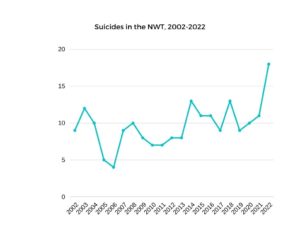More people have committed suicide in the NWT so far this year than in any other year in at least two decades.
That’s according to newly-released data from the NWT Coroner’s Office.
Eighteen suicides have been recorded so far in 2022, a significant increase over the 11 recorded in 2021.
In 2021, the North Slave region led the territory in suicides, with six out of 11; So far this year, the Beaufort Delta region led the territory with seven out of 18.
Since 2002, the years with the next-most suicides have been 2014 and 2018, with 13 suicides each.
The coroner’s office releases annual reports that include statistics on suicide. In a release, the coroner’s office said the figures were released early this year “due to the increased number of suicides so far in the 2022 calendar year.”

“Once we really looked at the data, we realized that the numbers for the 2022 year were up significantly over the previous year,” says Garth Eggenberger, the territory’s chief coroner. “And actually, once we looked at the 10-year review that we did in 2020, it showed a dramatic spike. So that’s why we wanted to release it early, so that we could get a response now, rather than a year from now.”
It’s unclear what caused this year’s spike in suicides: Eggenberger says patterns like the over-representation of men – 22 out of 29 cases in the past two years – or the presence of alcohol in a majority of cases are typical for suicide. “There’s no factors that we see in these cases that are any different from the other cases in previous years,” he says. “There’s nothing additional, it’s just a spike in the numbers. And we’re not aware of what’s going on, or how we can mitigate it.”
Nor, says Eggenberger, is it clear whether the spike is part of a larger trend: Over the past two decades, suicide rates in the territory have remained relatively stable. “If we take the 2022 rate out, if we leave that and look at the 20-year rate, it’s a slight rise or remains the same — it’s a steady trend,” says Eggenberger. “But this 2022 rate is almost double already this year, and we haven’t even finished the fourth quarter.”
For those struggling with suicidal thoughts and their loved ones, Eggenberger says the Department of Health and Social Services’ website, local health centres, and help lines are all good places to start. “[These victims] appear to be in trouble in their lives. And they need someone to help them to sort out the things that are happening in their lives so that they make the decision to live. That’s really what it is.”
“I think that the help is out there. Sometimes you might have to really push for help, but there is help there available.”
Those struggling with suicidal thoughts can contact the NWT Help Line 24/7 at 1-800-661-0844, or Kids Help Phone at 1-800-668-6868.





